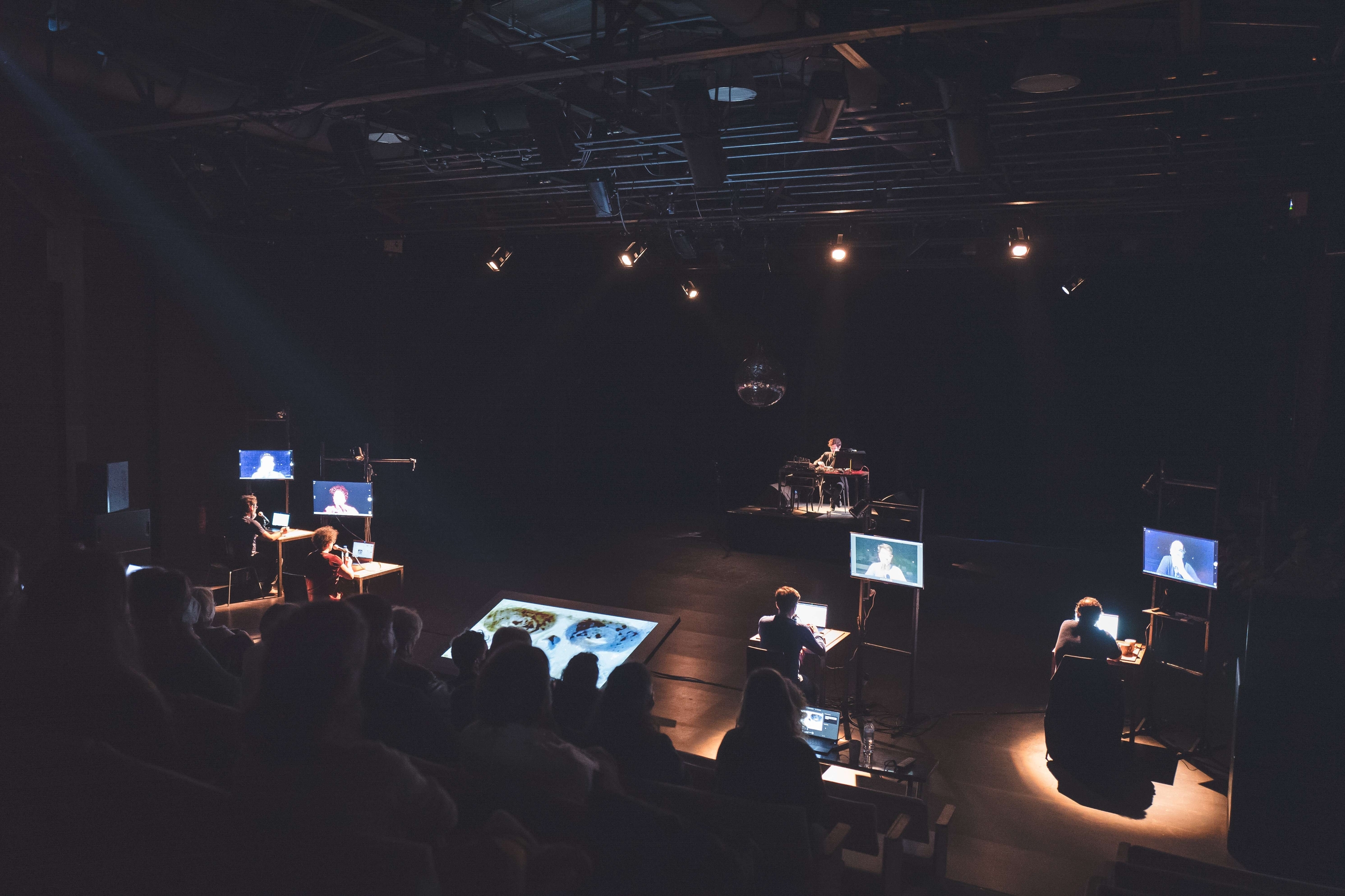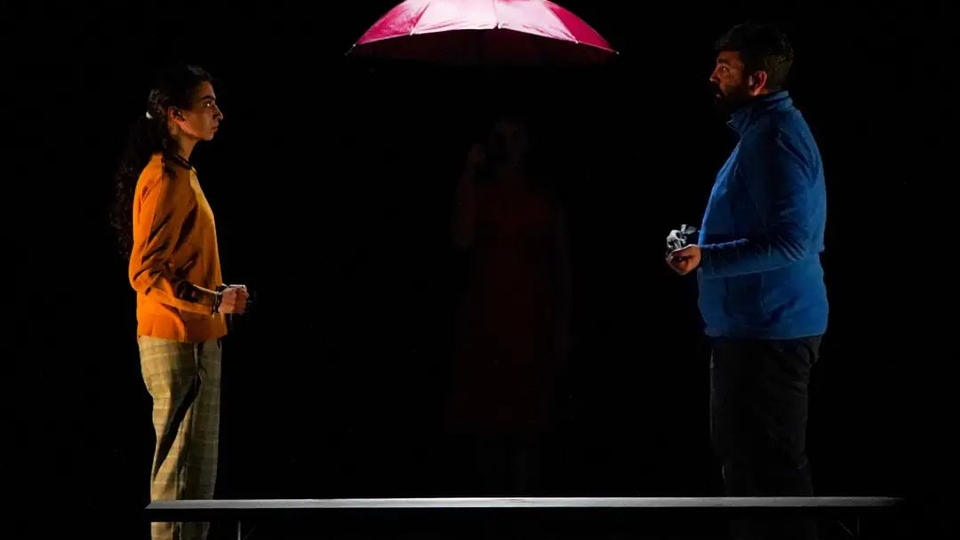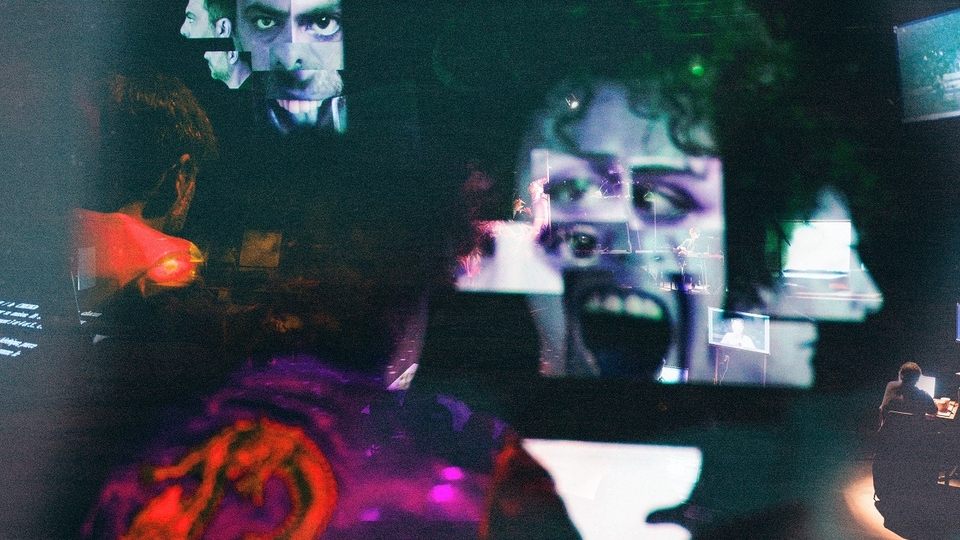Zoukak’s Political Theater: A Space for Collective Reflection Amid Crisis
As Israel was bombarding Lebanon during the 2006 war, a small group of playwrights, directors, and actors were asking themselves how theater could address the situation they were experiencing and engage with the war.
It was then that Maya Zbib, actress, director, writer and co-founder of Zoukak, decided that she wanted to fully embrace her profession. She and five other artists came together to develop, as a theater troupe, a practice with its own artistic form, political voice, and modes of public engagement.
“The main goal was not to produce shows. It was to think about our practice and profession together, to develop our tools, and to discuss the topics that we want to tackle,” says Maya.
Sixteen years later, the COVID-19 pandemic, Lebanon's economic collapse, and the Beirut port explosion are raising these considerations yet again.
Like other theater companies in Lebanon, the Zoukak collective has spent the past two years figuring out how to survive and produce cultural work when money is scarce and gathering in person is fraught with difficulties. The collective has come up with new ways to stay afloat, guided by a deep belief in the role of theater when things fall apart.
Bursting the Bubble
Zoukak is a niche theater company that has become an important player in Lebanon’s cultural and political life. Since its creation in 2006, the collective has produced shows in Lebanon and abroad, organized drama therapy workshops, and led professional training for aspiring artists.
Marianne Kortbani has been on Zoukak’s executive team since 2017. As a program manager, she is privy to the institutional gymnastics, not least of which is funding, that are required to sustain Zoukak in the crisis. She stumbled upon the collective while finishing her master’s program in cultural management.
“It changed my life. You grow so much in ways you never expected. It’s a challenging space but at the same time, it’s very rich,” she tells The Public Source.
Marianne found a welcoming space in Zoukak that is different from the rest of the cultural “bubble” in Lebanon.
“We cannot be in [this] place anymore without involving ourselves, our stories, and our beliefs.” — Jana Bou Matar, artist and assistant director at Zoukak
Maya agrees that it’s mostly the “cultivated elite” that gets to watch theater, adding, however, that Zoukak strives to work with performers and audiences from diverse backgrounds in and outside the city. Migrant workers, refugees, and other marginalized and low-income communities who have been excluded from cultural life are part of Zoukak’s programming. “We try to deal with the city or the country [on their terms], not as bubbles.”
Jana Bou Matar, a Lebanese University theater graduate, is one of the young artists who recently started working with the collective following her participation in Zoukak’s mentorship program. She is the assistant director and stage manager for the collective’s current production, The Rave Empire, an interpretation and deconstruction of the story of the Roman emperor Julian who sought to reinstate polytheism as a political philosophy.

The Rave Empire is a play within a play directed by Junaid Sarieddeen. It is a deconstruction of Henrik Ibsen’s lesser known play “Emperor and Galilean”. It questions monotheism, polytheism, and “everything mono and poly,” but also the idea of fragmented identities and what is truth from a personal perspective, according to Maya Zbeeb. Reims, France. January 27, 2022 (Photo courtesy of Zoukak)
In times of crisis, she has found it imperative to integrate a political dimension into her work.
“In this moment of change, theater becomes more present because there's a need for this collective process of reflection,” she states. “We cannot be in [this] place anymore without involving ourselves, our stories, and our beliefs.”
Surviving the Crisis
Since the start of the economic collapse in 2019, Lebanon’s currency has lost more than 90 percent of its value, while 82 percent of the population lives below the poverty line.
Lebanon’s theater scene has not been spared by the crisis.
“We are on survival mode; the risk of dying is equal to, if not bigger than, the chance of survival,” says Hanane Hajj Ali, a theater maker, artivist, teacher and founding member of several cultural institutions, notably Culture Resource (Al-Mawred Al-Thaqafy).
She explains that remaining cultural spaces and institutions in and around Beirut, like Ashkal Alwan, Station, Sunflower theater, Collectif Kahraba and Masrah Al Madina, are struggling in terms of finance, sustainability, and workers.
“[In cultural work] we are on survival mode; the risk of dying is equal to, if not bigger than, the chance of survival." —Hanane Hajj Ali, theater maker and artivist
The destruction of Zoukak’s studio in Karantina in the Beirut port explosion, on August 4, 2020, dealt a hard blow to the collective.
“I haven’t yet come to terms with the fact that our space was destroyed during the explosion,” Maya confides to The Public Source, adding that she has visited the former space just once since.
“At first, after the explosion, I didn’t want to do anything at all. I didn’t want to make art anymore; I didn’t understand what happened. But when I saw the younger artists, eager to work, I had to support them.”
Marianne explains how as management, they were “forced by the crisis to be creative with strategies to keep the organization going,” which is a constant challenge.
Since the destruction of the space in Karantina, the executive team has been working from offices in Tayouneh, while the artistic team has partnered with Station to implement workshops and the artistic program.
Despite the precarious situation in Lebanon and the successive shocks, Zoukak has been able to nurture a space for theater.
Since its creation, Zoukak has sought ways to be sustainable. In 2019, it was able to cover 45 percent of the studio’s expenses through profits from ticket sales and by lending the space to collaborators.
At the same time, psycho-social work through theater allowed the collective to tap into development funds from international organizations. This has made it possible for Zoukak to keep going, even as other sources of income have dwindled.
“Now we are able to open up a space for others, for younger generations. It is beautiful that people are coming to us. [...] I wake up every day and I get to do something that I love and I feel great. It’s weird,” Maya muses.
“When everything was collapsing in the country around us, we realized that we really made the right choice [to continue].”
Marianne has noticed that pitches for plays, multimedia projects, and multidisciplinary performances are rising, as are applications to participate in training since the launch of the mentorship program in 2021.
“From what I’ve seen, the crisis has …pushed more artists to come forward with projects,” she tells The Public Source. “The urge to create is increasing with the crisis.”
Yet abundant creativity doesn’t mean that Zoukak and its artists are immune to the everyday realities of electricity shortages, the impact of fuel prices on transportation, the collapse of the banking system, and growing economic precarity.
“Everything is harder,” according to Marianne.

In Meaning Making Cocktail, directed by Jana Bou Matar, characters navigate their stay or exit in a collapsing city. “[They] are in the grip of time, ideology, sex, death, illusion, and truth, as the ‘here and now’ keep escaping from them.” Beirut, Lebanon. December 10, 2021. (Photo courtesy of Zoukak)
In December 2021, while producing her show “Meaning Making Cocktail,” a story about one person leaving a city, as another one stays while the city is falling apart, Jana and her team faced daily obstacles. They were not able to come together as often as they wanted because of the high cost of transportation, and had to schedule their meetings around the other jobs they had to take to survive.
“For many of us, the show became the second thing we’re doing,” Jana recalls.
She had to adapt her creative process to the worsening conditions of the country, something she says she was able to do rather smoothly because of the experimental nature of Zoukak productions.
Hanane Hajj Ali, who discovered her passion for theater in shelters during the Lebanese Civil War, thinks that crises and wars affect the “type, shape and format” of art and forces artists to invent new tools to function and create.
She says that crises are not merely material to use in the creation process, more importantly, they push people to ask questions and reassess what they know.
“Wars put the events, the facts, and the relationships on a critical platform,” she continues. “I felt that it was our duty to dig deeper and keep searching for answers.”
A Space for Collective Reflection
Today, the crisis is once again forcing a collective reflection and ways of working for Zoukak.
The collective’s non-hierarchical structure, a key element since its foundation, relies on each individual feeling a sense of responsibility towards their work, Maya notes.
“Of course, the director leads the project, but it is still a collective process and everyone is involved,” Jana explains, adding that the director, writer, actors and scenographers are all involved in the creative process.
The group adopts a theater-making method known as “devised theater,” or “collective creation,” a process in which each artist contributes to the script and adapts it in a way that resonates with them. Such a flexible approach allows the troupe to work around everyday challenges and create productions within the limitations of their circumstances.
“Each of us sees the material based on our history and baggage in this place, which enriches the whole experience,” Jana adds.
"“In that moment on stage, I believe we are creating a ‘hole’ in the system... It's a moment of reflection. It’s magical.”—Jana Bou Matar
The subjects tackled in Zoukak’s productions reflect the organization’s participatory structure, starting from the artists’ personal struggles which then inform larger narratives.
“We focus on confronting the structures from inside, from gender inequality to the separation of state and religion, domestic violence, etc. We always start from the personal and then we generalize to the global,” Maya explains.
For Jana, the personal has always been political; the crisis has only brought this more to the surface. She sees theater as a political act, especially in Lebanon where artists choose this career against all odds, joining an unstable cultural industry, even more so today.
In the middle of chaos and crisis, the stage provides another dimension of existence.
“The place where and when we are creating or performing is a moment of reflection. It’s magical,” Jana ponders.
The audience is also part of this reflection process.
“In that moment on stage, I believe we are creating a ‘hole’ in the system,” the young artist continues, “creating actual political change through this collective reflection.”
Finding Meaning in Chaos
Like others on the artistic scene, Marianne has been reflecting on her role, personally and professionally, during the crisis.
“What are we doing? What is the value of art in this situation? What is theater doing and what is [its] value, especially when we couldn’t really do theater because of COVID, the crisis, or the Tayouneh shooting?”
While these questions have no definitive answers, asking them has helped Zoukak redefine its organizational structure and political messaging on stage.
“Our focus moving forward is the transmission of tools and resources to the artists and practitioners who want, or have, to stay here.” —Marianne Kortbani, program manager at Zoukak
“We found our focus moving forward: it is the transmission of tools and resources to the artists and practitioners who want, or have, to stay here,” Marianne adds.
“The chaos helped us see our priorities,” Maya concurs.
However, this optimism is not free of doubts.
Like Maya, Marianne went through a rollercoaster of emotions in the wake of the explosion, thinking she no longer wanted to work in theater when people were going through so much pain and hardship.
"[Theater] is about connecting people on the level of ideas, emotions, and beyond. People need tenderness and connection.” —Maya Zbib, Zoukak co-founder
But then it struck her. “If we don’t work in theater, what is going to be [lost]?” After a brief pause, Marianne continues, “[what would be lost is] a space where people can talk to each other and think together about important topics that could help us, directly or indirectly, explore ways of getting out of the political crisis.”
“In the end, any change that will happen in society or in politics needs to start in individuals, and theater can impact change in individuals,” she adds. “I’ve experienced this myself.”
Hanane expresses a similar sentiment. “Theater is the place where the human rediscovers the importance, and value, of their humanity and their role as an individual in community.”
For Maya, “it’s about connecting people on the level of ideas, emotions, and beyond. People need tenderness and connection.”
